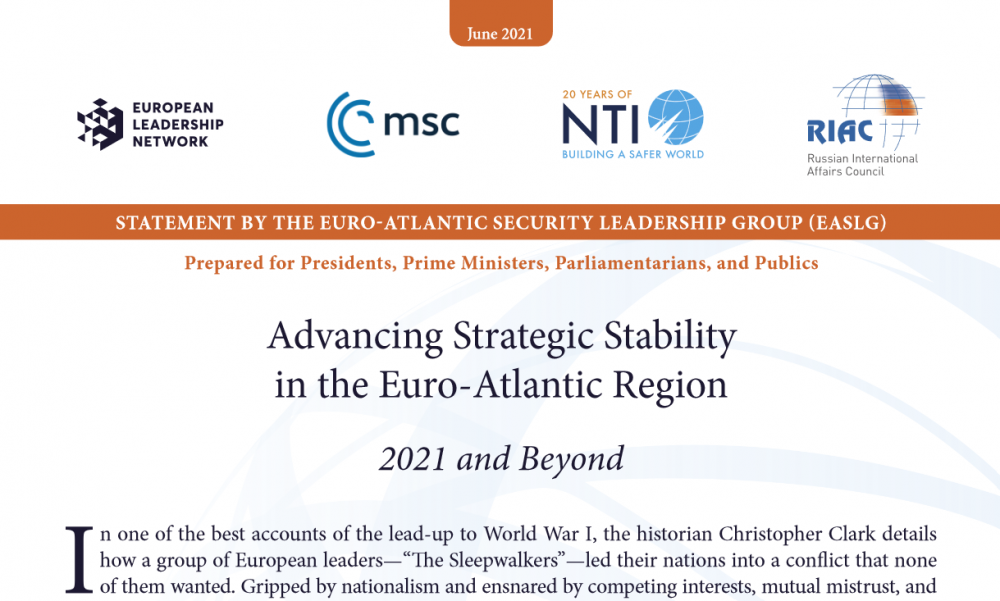Statement from the Euro-Atlantic Security Leadership Group on Ukraine
The statement is the result of six months of intensive work within the EASLG on the issue of Ukraine and Euro-Atlantic Security
BERLIN – Today at the American Academy in Berlin—one week before government leaders from the U.S., Europe and Russia begin a crucial series of meetings in Europe—members of the Euro-Atlantic Security Leadership Group (EASLG) released a statement with key recommendations for “Advancing Strategic Stability in the Euro-Atlantic Region, 2021 and Beyond.”
With 45 signatories from 13 countries across the Euro-Atlantic region, the statement points to a growing risk of—and a potentially catastrophic inattention to—a security crisis involving an escalation or miscalculation leading to nuclear use. Beginning this weekend at the G7 summit and proceeding through next week’s NATO, US-EU, and US-Russia summit meetings, leaders will have a rare opportunity to advance multilateral dialogue, principles and practical steps to improve mutual security at a precarious moment.
The EASLG statement describes how security would be strengthened through restored dialogue, adoption of principles to advance strategic stability and reduce the risk of miscalculation, and implementation steps for managing instability and building mutual security.
The five EASLG co-conveners—Des Browne, Wolfgang Ischinger, Igor Ivanov, Ernest J. Moniz, and Sam Nunn—have sent the statement to more than 30 Euro-Atlantic heads of state and government, ministers and senior officials in 13 countries, the European Union, and NATO.
The co-conveners emphasized that, “Europe, Russia, and the United States face a range of grave security issues. The decision by the U.S. and Russian presidents to extend the New START Treaty confirms that nations can still act to advance their common interests. We urge you to build on this achievement, working with other leaders from across the Euro-Atlantic region.”
###
Des Browne, Wolfgang Ischinger, Igor Ivanov, Ernest J. Moniz, Sam Nunn, and their respective organizations—the European Leadership Network (ELN), the Munich Security Conference (MSC), the Russian International Affairs Council (RIAC), and the Nuclear Threat Initiative (NTI)—work with former and current officials and experts from a group of Euro-Atlantic states and the European Union to test ideas and develop proposals for improving security in areas of existential common interest.
The EASLG operates as an independent and informal initiative, with participants who reflect the diversity of the Euro-Atlantic region from the United States, Canada, Russia, and 15 European countries.
***
Other NTI resources related to the Administration’s meetings in Europe include our Atomic Pulse blog post on What is “Strategic Stability” and Why is it Important to U.S.-Russia Relations?, a virtual panel with NTI leaders and other experts on Recommendations to the U.S., Europe, and Russia, and our new policy papers on recommendations for changes to U.S. nuclear policy and posture and engagement with Russia and China.
Sign up for our newsletter to get the latest on nuclear and biological threats.
The statement is the result of six months of intensive work within the EASLG on the issue of Ukraine and Euro-Atlantic Security
The paper highlights the need for renewed attention to the catastrophic effects of nuclear conflict as a crucial step toward reducing the risk of nuclear use.
A new report from NTI highlights the critical need for a global diplomatic approach to address growing cyber risks, including, where possible, through cooperation between the United States and Russia.


